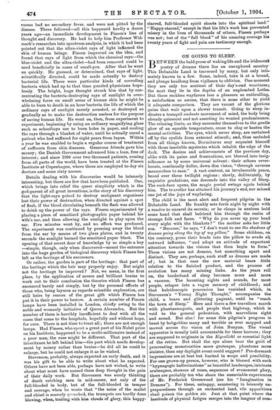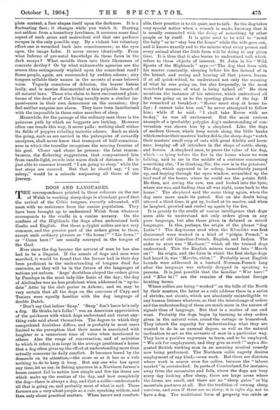B ET WEEN the bald prose of waking life and the
iridescent poetry of dreams there lies an unexplored country This Debatable Land is traversed by many, but only inti- mately known to a few. Some, indeed, take it at a bound, and plunge headlong from vigilance to oblivion. One moment they are only too sentient of their day's-end weariness; the next they lie in the depths of an unplumbed Lethe. But these reckless wayfarers lose a pleasure so enthralling, a satisfaction so serene, that there is none other to yield it adequate comparison. They are vacant of the glorious gains that wait upon a slower transit. Going to sleep in- dicates a tranquil andante movement of mind, the body being already quiescent and not asserting its wonted predominance. The relaxing limbs, as they surrender themselves to the gentle glow of an equable temperature, cease to clog or hasten the mental activities. The eyes, which never sleep, are curtained off by the eyelids from external stimuli ; and, thus secluded from all things known, Dormiturus may acquaint himself with those insoluble mysteries which inhabit the edge of the dark. The desires and achievements of the previous day, alike with its pains and frustrations, are blurred into insig- nificance as by some universal solvent : their echoes rever- berate, continually duller, down dim vistas, "through caverns measureless to man." A vast content, an invulnerable peace, brood over these twilight regions : slowly, deliberately, by exquisite gradations, one descends into the valley of Sleep. The rock-face opens, the magic portal swings again behind him. The traveller has attained his journey's end, nor missed one jot of the joys of wayfaring.
The child is the most alert and frequent pilgrim in the Debatable Land. He frankly sets forth night by night with a resolve to unravel its secrets; or he clasps in anxious hold some hand that shall befriend him through the realm of strange folk and faces. "Why do you cover up your head every night with the blankets ? " the mother asks her little son. "Because," he says, "I don't want to see the shadows of dreams going along the top of my pillow." Some children, on the contrary, press their heads into the pillow to evade all outward influence, "and adopt an attitude of expectant attention towards the visions that then begin to form." These visions are not dreams, but something apart and distinct. They are, perhaps, such stuff as dreams are made of ; but in that case the raw material bears little relation to the finished product, and the process of evolution has many missing links. As the years roll on, the borderland of sleep becomes more and more a vacuum. The haunting sights and sounds, for most people, relapse into a vague memory of childhood ; and that kaleidoscopic procession has vanished which, in Stevenson's "Young Night Thought," accompanies the child, a brave and glittering pageant, until he "reach the town of Sleep." Here and there a few travellers march with phantasmagoria, and people that highway, which is void to the general pedestrian, with marvellous sight and sound. But alas ! for some this pilgrim's progress is beset by hobgoblins many and terrible as ever mopped and mowed across the vision of John Bunyan. The visual apparatus is usually held accountable for these horrors ; they are supposed to originate in the Eigenlicht or essential light of the retina. But shall the eye alone bear the guilt of procreating monstrosities more grotesque, phantoms more sinister, than any daylight event could suggest ? Pre-dormant impressions are at best but limited in scope and possibility. For one grown-up person, however, who is blessed with such " hypnagogic hallucinations" as beautiful landscapes, intricate arabesques, showers of roses, sequences of evanescent glory, there are probably ten who share the unenviable experiences of Mr. Frederick Greenwood (see his "Imagination in Dreams"). For these, unhappy, sauntering in leisurely un- preparedness through an enchanted land, vile apparitions shall poison the golden air. Just at that point where the lassitude of physical fatigue merges into the languor of cam.
plete content, a face shapes itself upon the darkness. It is a fluctuating face : it changes while you watch it. Starting not seldom from a transitory loveliness, it assumes some final aspect of such gross and malevolent evil that one perforce escapes in the only possible way. By a violent but voluntary effort one is wrenched back into consciousness ; as the eyes open, the image fades. It never recurs identically. From what Inferno of pre-natal knowledge do these faces in the dark escape P What moulds them into their likenesses of concrete devilry ? Or by what unknowable agencies are the senses thus outrageously waylaid upon the somnolent road ? Some people, again, are surrounded by sudden odours ; airy tongues syllable their names in the accents of some beloved voice. Vaguely conscious of delusion, the hearer listens lazily, and is nowise disconcerted at this palpable breach of all natural laws. Those who claim to have encountered phan- tasms of the dead or of the living usually note a similar im- passiveness in their own demeanour on the occasion ; they feel neither surprise nor alarm. They have been familiarised with the impossible in these outer marches of sleep.
Meanwhile, for the passage of the ordinary man there is the primrose path by which no boggarts are lurking. However often one treads this way, it never palls: nothing shall wither its fields of poppies exhaling narcotic odours. Such as shirk the going, such as are carried in the palanquins of cowardly anodynes, shall never know that transport of half-conscious- ness in which the traveller recognises the nearing frontier of his goal. Closer and closer he presses : the faint remem- brances, the flickering suggestions, that companioned him from candle-light, recede into warm dusk of distance. He is just able to reassure himself, "I am going to sleep," while the last steps are covered. But that he should say, "I am asleep," would be a miracle surpassing all those of the journey.























































 Previous page
Previous page